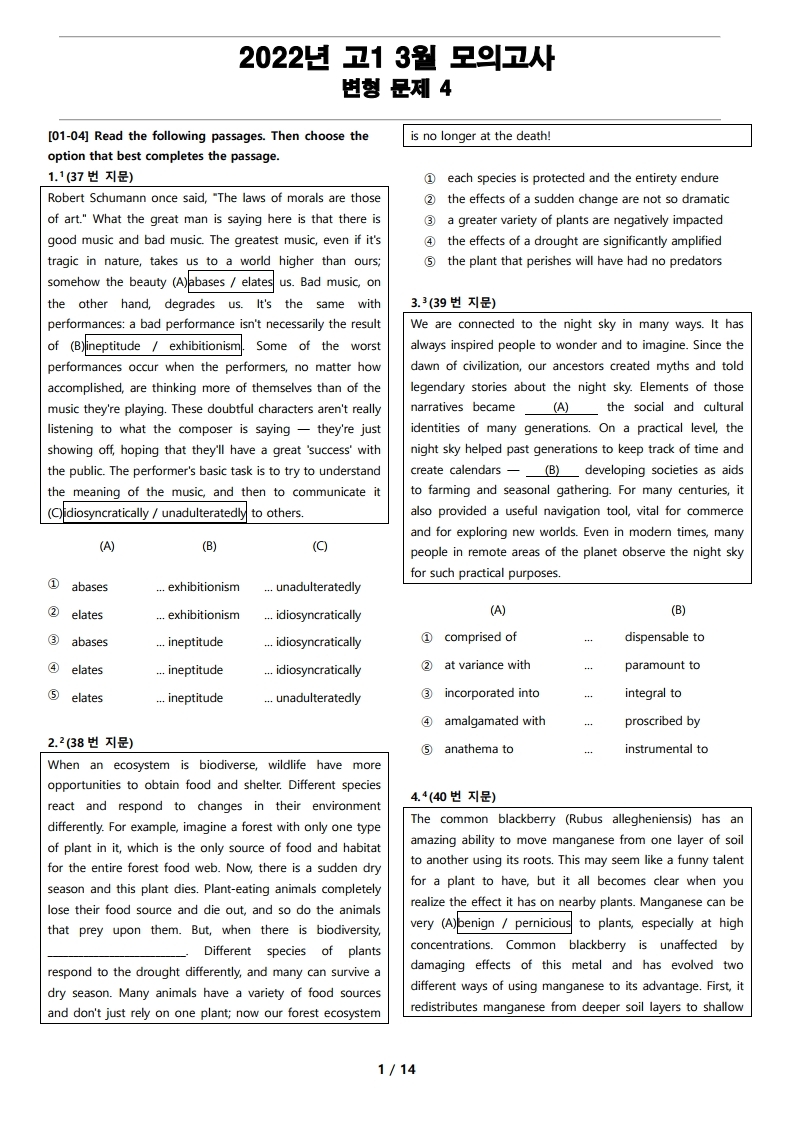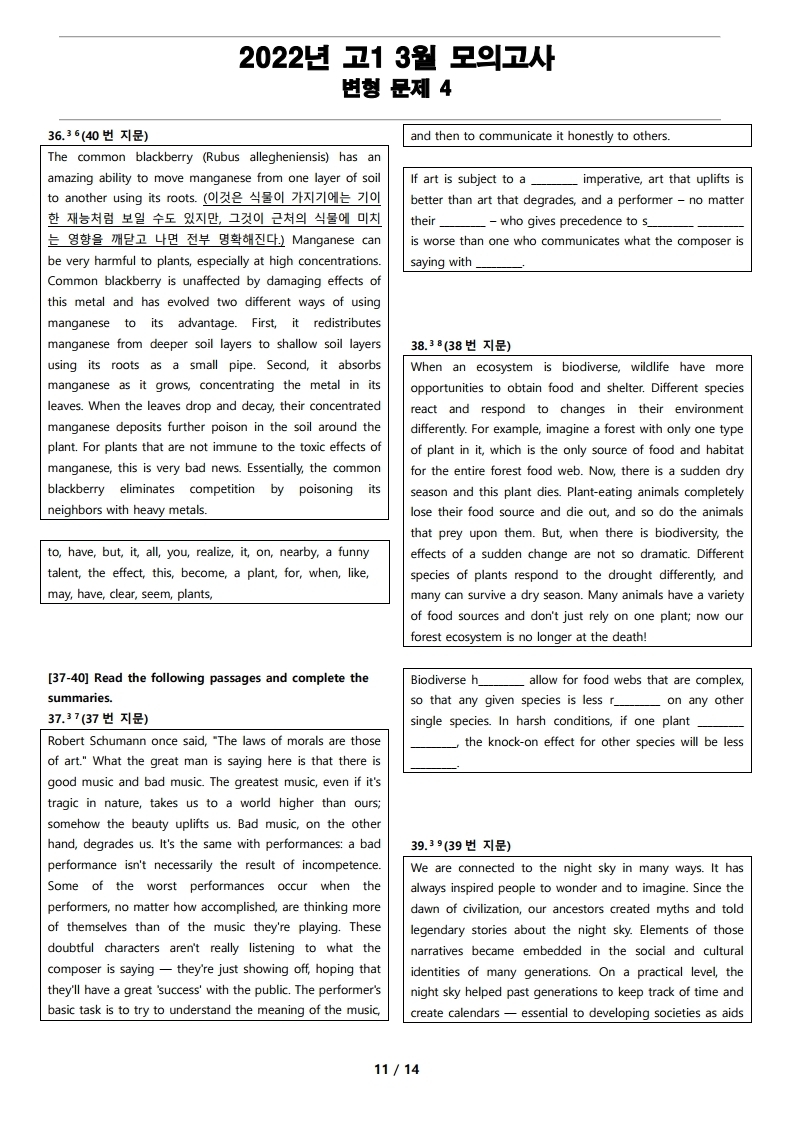2022년 고1 3월 전국 연합 모의고사
변형 문제 4
일반 워크북 형태의 문제에서 벗어나 The Makings가 만든
2022년 고1 3월 전국 연합 모의고사 변형 문제 4
출판사에서 오랫동안 영어 번역과 교정을 하셨던 원어민 선생님과
현직에서 강사를 하고 있는 연구진들이 학생들을 위한
최상의 2022년 고1 3월 전국 연합 모의고사 변형 문제 4 를 선보입니다.
사고력과 이해력을 요구하는 문제들로 내신 대비 뿐만이 아니라
수능도 한꺼번에 공부하실 수 있는 자료입니다.
중간고사&기말고사 전에 더메이킹스(The Makings)에서 제작한
2022년 고1 3월 전국 연합 모의고사 변형 문제로 마무리 하세요.
정답 확인하러가기!
2022년 고1 3월 전국 연합 모의고사 변형 문제 4
2022년 고1 3월 전국 연합 모의고사 변형 문제, 내신대비, 영어내신자료,고등영어자료, 모의고사 변형문제,전국 연합모의고사 변형자료, 모의고사 영어 서술형 대비, 대치동 고등 영어자료, 대치
themakings.co.kr
themakings.co.kr
The Makings의 2022년 고1 3월 전국 연합 모의고사
변형 문제는 총 11개의 유형으로 구성되어 있습니다.
1. 빈칸 채우기(객관식)
2. 글의 내용 일치/불일치(객관식/한글 선택지)
3. 글의 내용 일치/불일치(객관식/영어 선택지)
4. 글 끼어 넣기(객관식)
5. 어법(서술형)
6. 어휘(서술형)
7. 주제문(객관식/영어 선택지)
8. 어휘 빈칸 채우기(서술형)
9. 영작(서술형)
10. 요약문 완성하기(서술형)
11. 문단 재배열 하기(객관식)
더메이킹스(The Makings)가 제작한 2022년 고1 3월 전국 연합 모의고사 변형 문제 4의 지문입니다.
1번 지문(문항 번호 37번)
Robert Schumann once said, "The laws of morals are those of art." What the great man is saying here is that there is good music and bad music. The greatest music, even if it's tragic in nature, takes us to a world higher than ours; somehow the beauty uplifts us. Bad music, on the other hand, degrades us. It's the same with performances: a bad performance isn't necessarily the result of incompetence. Some of the worst performances occur when the performers, no matter how accomplished, are thinking more of themselves than of the music they're playing. These doubtful characters aren't really listening to what the composer is saying ― they're just showing off, hoping that they'll have a great 'success' with the public. The performer's basic task is to try to understand the meaning of the music, and then to communicate it honestly to others.
2번 지문(문항 번호 38번)
When an ecosystem is biodiverse, wildlife have more opportunities to obtain food and shelter. Different species react and respond to changes in their environment differently. For example, imagine a forest with only one type of plant in it, which is the only source of food and habitat for the entire forest food web. Now, there is a sudden dry season and this plant dies. Plant-eating animals completely lose their food source and die out, and so do the animals that prey upon them. But, when there is biodiversity, the effects of a sudden change are not so dramatic. Different species of plants respond to the drought differently, and many can survive a dry season. Many animals have a variety of food sources and don't just rely on one plant; now our forest ecosystem is no longer at the death!
3번 지문(문항 번호 39번)
We are connected to the night sky in many ways. It has always inspired people to wonder and to imagine. Since the dawn of civilization, our ancestors created myths and told legendary stories about the night sky. Elements of those narratives became embedded in the social and cultural identities of many generations. On a practical level, the night sky helped past generations to keep track of time and create calendars ― essential to developing societies as aids to farming and seasonal gathering. For many centuries, it also provided a useful navigation tool, vital for commerce and for exploring new worlds. Even in modern times, many people in remote areas of the planet observe the night sky for such practical purposes.
4번 지문(문항 번호 40번)
The common blackberry (Rubus allegheniensis) has an amazing ability to move manganese from one layer of soil to another using its roots. This may seem like a funny talent for a plant to have, but it all becomes clear when you realize the effect it has on nearby plants. Manganese can be very harmful to plants, especially at high concentrations. Common blackberry is unaffected by damaging effects of this metal and has evolved two different ways of using manganese to its advantage. First, it redistributes manganese from deeper soil layers to shallow soil layers using its roots as a small pipe. Second, it absorbs manganese as it grows, concentrating the metal in its leaves. When the leaves drop and decay, their concentrated manganese deposits further poison in the soil around the plant. For plants that are not immune to the toxic effects of manganese, this is very bad news. Essentially, the common blackberry eliminates competition by poisoning its neighbors with heavy metals.
'전국 연합 모의고사 변형 문제 > 고1 모의고사 변형 문제' 카테고리의 다른 글
| 2022년 고1 6월 전국 연합 모의고사 변형 문제 2 (0) | 2022.06.12 |
|---|---|
| 2022년 고1 6월 전국 연합 모의고사 변형 문제 1 (0) | 2022.06.10 |
| 2022년 고1 3월 전국 연합 모의고사 변형 문제 3 (0) | 2022.04.05 |
| 2022년 고1 3월 전국 연합 모의고사 변형 문제 2 (0) | 2022.03.31 |
| 2022년 고1 3월 전국 연합 모의고사 변형 문제 1 (0) | 2022.03.29 |

